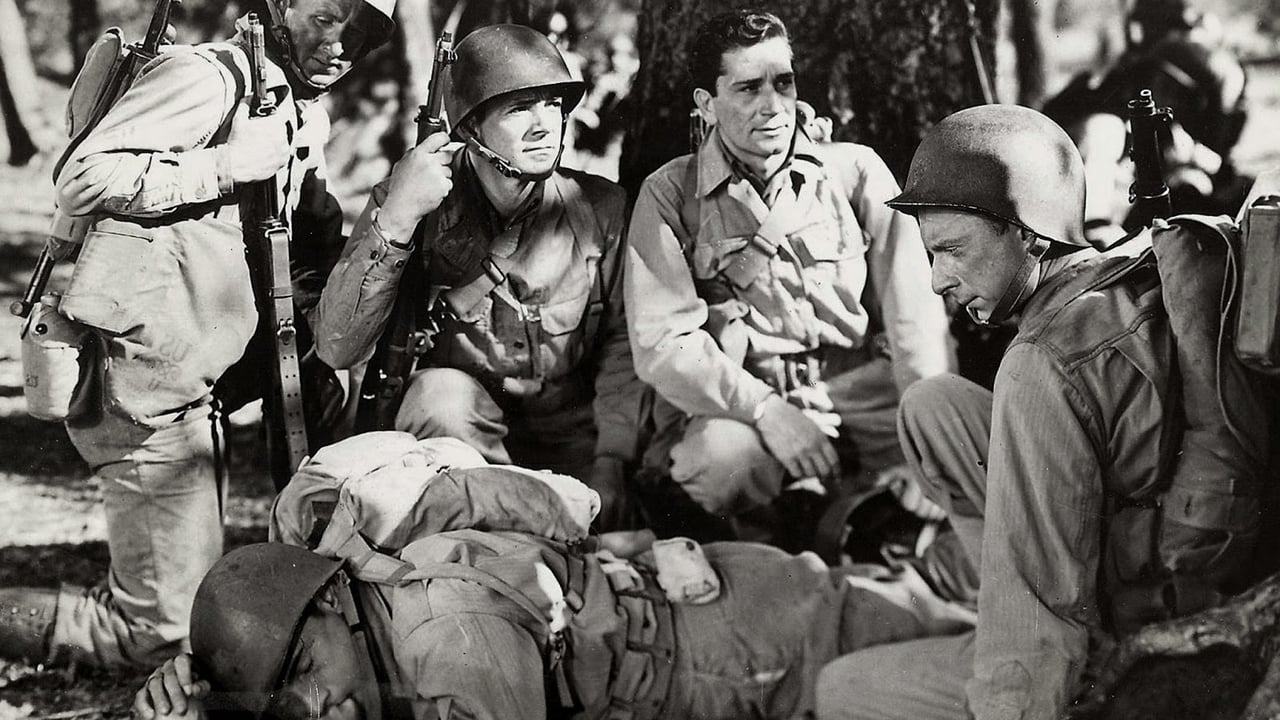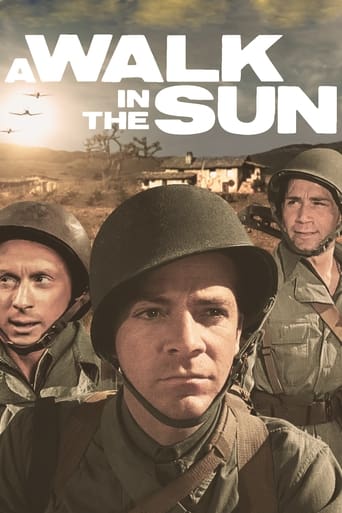

At first rather annoying in its heavy emphasis on reenactments, this movie ultimately proves fascinating, simply because the complicated, highly dramatic tale it tells still almost defies belief.
... View MoreThe plot isn't so bad, but the pace of storytelling is too slow which makes people bored. Certain moments are so obvious and unnecessary for the main plot. I would've fast-forwarded those moments if it was an online streaming. The ending looks like implying a sequel, not sure if this movie will get one
... View MoreThis is one of the best movies I’ve seen in a very long time. You have to go and see this on the big screen.
... View MoreThrough painfully honest and emotional moments, the movie becomes irresistibly relatable
... View MoreAn American platoon lands on the beaches on Salerno Italy and are tasked with taking a farmhouse farther inland. The movie begins in the dark early hours, in landing craft headed for the Italian coast, dialogue ensues. The platoon's Lt, is injured and eventually dies, leaving a number of sergeants to lead the platoon to the objective. More dialogue follows. Eventually they hit the beaches uncontested and dig so they can talk about nothing. In one of the few action scenes of the film, a medic (Holloway) is killed by a strafing plane, and more talk follows. They move inland all while talking and come across some deserting Italian soldiers. The token Italian American is able to speak to them and they get some info about the area. After more long winded chat of no importance, they get ready to hit a German half track. One of the sergeants basically wets his pants, cries, and can't fight. They blow up the half track and move on to the all important farmhouse. After much talk, they attempt to hit it, and they fail. They come up with a foolhardy plan to take the place. With much less casualties then would have actually happened, they manage to take the house and talk some more.I have to say this is one of the most disappointing "war films" I have ever scene. I'm amazed with a cast like this the film came out so poorly, in virtually every aspect. Lloyd Bridges seems to stand out by far and even his character is a bore. The real problem with the film is there is too much needless boring dialogue. Everyone knows to have a good film you need a good script and dialogue, the problem is that almost all of it is pointless. They attempted to show you what the average Joe would be talking about while he's out on patrol. But it becomes tedious and extremely boring, with dialogue if you're not outright laughing at for being so poor, you may just be fast forwarding. For instances some have said how "real" the dialogue is. Yet, near the end, they have just lost some men, are under fire and don't know how their going to take the farmhouse. So with no real emotion the one guy starts up a conversation about how a leaf off the ground is more complex than the human body. If it sounds stupid, it is. His first thoughts would be is he going to see his family again or live to see another day. Other ones are equally as silly, about dirt, apples, and how one man wants to be hit man after the war. The only scene that was good was when they talk to the Italians to get some information. It comes off well. But I haven't mentioned characters, because they are ones that no one could care about. I couldn't even give you a name. Although you really never see them, you will probably be begging for the Germans to attack just so something happens in the film. The song that is played periodically during the film is awful, but I can excuse this for it is not the tastes of my era.Those above aren't the only situations that are impractical. The officer is killed yet among at least 3 sergeants they have no idea what their doing. No one seems to carry a radio. When friends die, rather then stripping them of at least their ammo or weapon, they leave them there with a loaded Garand shoved in the ground. Same with the medic, he's killed and they don't take his supplies. And of course let's not forget the non climatic ending. Not only do they poorly plan the attack, but they are suppose to have cover from a machine gunner who does nothing but brag, yet he cant hit the broad side of a barn, or a farm house in this case. In reality virtually all of those men would be back in WWI, slaughtered from machine gun fire. If you wanted reality poor planning actually may be kosher to the green US military of the time, so maybe the movie is correct in that case.I know what people will say, go watch Private Ryan (overrated) or something with big special effects. No actually I don't need all that. Most of the greatest war films, among others were from years back, from black and white to color, with little or lots of violence, bad effects to great effects and with varying dialogue. This is just a poor war film. Guadalcanal Diary was made before this and is far superior on all levels. Among other greats about WW II, Attack!, The Longest Day, The Train, The Dirty Dozen, Bridge on the River Kwai, The Great Escape, and depending on how modern you want to be, Downfall. There are too many to name. I'm sure this holds a special place for some, but overall it is poorly done and should be avoided by most, unless a die hard WW II buff. 1 and half out of 10 stars.
... View MoreThe first twenty minutes of the film has soldiers engaged in a multitude of conversations in the dark. Then the sun comes up and they start walking, but they continue to talk non-stop. Most of what they say is neither amusing nor profound. They just blabber on and on about mundane things. It seems the soldiers can simply bore the enemy to death with their gabfest. This is hailed as realistic cinema, but reality does not a great movie make. There is also a corny ballad about the soldiers that's overplayed. Andrews and Conte lead a good cast, but are let down by the lame script. It perks up in the end, but it's too little, too late.
... View MoreIn Italy, a platoon of American GIs must rid a farmhouse of its Nazi occupants. "A Walk in the Sun" is expertly directed by Lewis Milestone, utilizing Russell Harlan's perceptive camera. It's unusually poetic, for the time, courtesy of writers Harry Brown and Robert Rossen. And, certainly, the film should grow in stature, over the years, when compared to the more typical war dramas released during its era. Upon release, the film was no doubt considered noteworthy for its "realism". Presently, this strength is weighted. Still, the film's substance endures...Strong characterizations are provided by the cast of soldiers. Two stand out, and give the film greater emotional depth. Though it begins, necessarily, as a team effort, reluctant Dana Andrews (as Bill Tyne) emerges as the "hero"; and, John Ireland (as Windy Craven) stands out among the other soldiers. Mr. Andrews is the man who takes command, after leader Herbert Rudley cowers under the pressure. Andrews is terrific; especially, note how he fights off the same war fatigue and mental illness that claimed his predecessor.Mr. Ireland's performance, as a poetic minister's son, is award-worthy. Each of the film's characters attempt to grab you: "the farmer", "the prophet" accompanied by an almost too sentimental, heart-tugging soundtrack. But, however you try to resist, it's impossible not to fall under Ireland's spell, as he explains "G.I. Dirt", and writes letters home "in his head". While Andrews takes explicit control of the mission, it's Ireland who implicitly provides the battle plan. The film does well in portraying a platoon's waiting, talking, teamwork, and action during war. ******** A Walk in the Sun (12/3/45) Lewis Milestone ~ Dana Andrews, John Ireland, Richard Conte, Lloyd Bridges
... View MoreI first saw A Walk in the Sun in the early 1960's on TV with my Dad, who was a combat veteran of the 36th Infantry Division. His unit was made up of Texas National Guard soldiers and draftees that was one of the first US Army units that landed in Europe at Paestrum, Italy in September 1943.The movie depicts a rifle company assigned to capture a farmhouse inland from the Salerno, Italy beachhead. This movie shows the operation of an infantry unit with more realism without all the special effects used by Hollywood in subsequent films. The coordination of the men and their dialog (with "loving" substituted for the beautiful soldier's language) as spoken between Richard Conte and George Tyne's characters was realistic and rang true to me as a kid growing up in Brooklyn, NY. It's interesting to note that many young actors like Lloyd Bridges and Norman Lloyd (who is still alive and active) made up an excellent ensemble cast. Years later after researching the history of the 36th Division and the Italian campaign, I feel that A Walk in the Sun along with The Story of GI Joe, most closely approximates the soldier's view of combat.
... View More